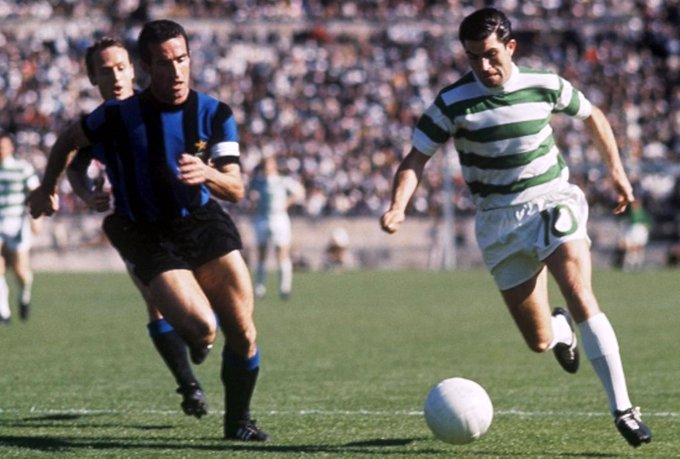I read the news today, oh boy . . . and after reading the headlines before grabbing a quick cup of coffee and toast on my way out the door to go to work, I rued the gloom that eventually ended up following me for the entire day: Celtic legend Bertie Auld had passed away.

There are only a handful of players in the wider Celtic’s history that define a certain aspect of the club’s persona.
Vision was always defined by Brother Walfrid, who had the idea to feed the poor through the game of football, and then later by Willie Maley, who brought the foundation of quality players to the Hoops.
Leadership was always defined by Jock Stein on the sideline — espousing pure, beautiful, inventive football — and Billy McNeill implementing it on the pitch.
Skill had a wide variety of representatives in Celtic’s history, but none was superior in all of Celtic history than Jimmy Johnstone.
Personality and heart had but one shining representative: Bertie Auld. He understood and reflected what it means to be Celtic. He was faithfully Celtic, through and through.
Had Bertie done nothing else in his entire Celtic career, he achieved legendary status in Lisbon even before the game began: As the legend goes, in the tunnel awaiting to go out onto the pitch, standing next to European powerhouse Inter Milan, Bertie started singing “The Celtic Song,” in which the rest of his teammates joined in to the bemused Italians. John Fallon gives a great description of the scene in Clover Flims’ “The Fans Who Make Football” in their Celtic episode starting at around 20:50 – however, the whole episode is worth a watch, if you haven’t already seen it.
But he did so much more. For the fans who were not born yet, or not old enough to experience the glory and significance of the 1967 European Cup, Bertie Auld was the conduit – the connection to the heyday when Celtic was the first non-continental team to bring the trophy up to the British Isles. His accessibility – Bertie was always available for banter with fans, and was never at a loss to regale the public, whether it was a small group or a broadcast studio audience, with tales of Celtic greatness — was a touchstone of what it means to be Celtic.
The testament of how loved Bertie was by Celtic fans is the number of pictures posted on social media by people who had their pictures taken with him. Those are only the ones that are being shared, and there are probably more that aren’t, but it speaks to the fact that Bertie was always accessible and available to the people, and always made time for the fans. Always.
One of the most moving tributes-in-288-characters was posted on Twitter by Celtic Park tourgide Davie McLaughlin, with a picture of Bertie and Davie’s son.
His love for Celtic was boundless, and it showed. Day in and day out. He understood that football is nothing without the fans, and as a result, he seemed to give back to the fans a hundredfold, because at the end of the day we are all Celtic.
Bertie understood that. He was one of us, and that’s why we all loved him.
That’s what I thought this morning, driving down Highway 9 from Felton to Santa Cruz on my way to work, negotiating every serpentine curve through the redwoods, all the while singing “The Celtic Song.”
But I’m hearing the song in Bertie’s voice, not mine.
Requiesce in pace, Bertie. You’ll never walk alone.